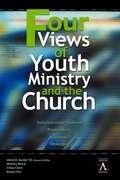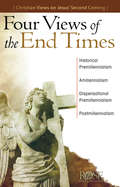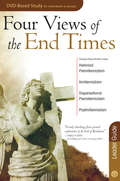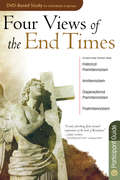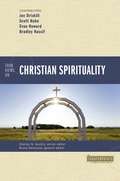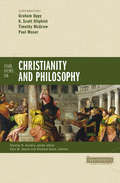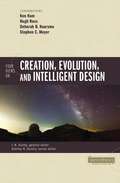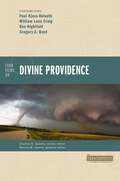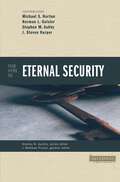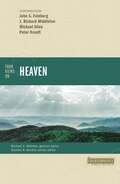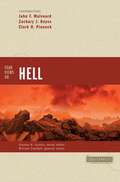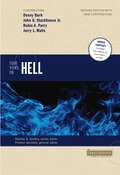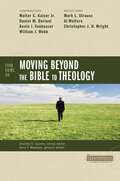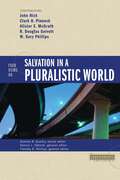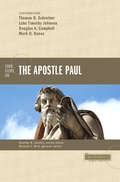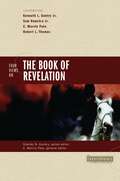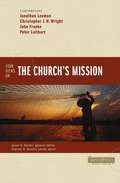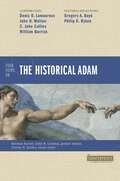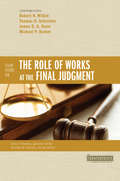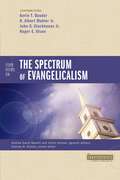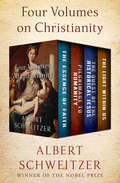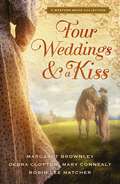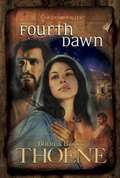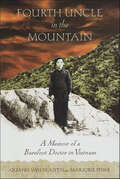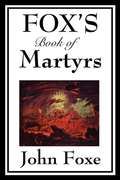- Table View
- List View
Four Views of Youth Ministry and the Church: Inclusive Congregational, Preparatory, Missional, Strategic (YS Academic)
by Chap Clark Malan Nel Mark H. Senter III Wesley BlackJoin the conversation as experts propose, defend, and explore Four Views of Youth Ministry and the Church. In a dialog that often gets downright feisty, four youth ministry academicians delineate their distinct philosophical and ecclesiological views regarding how youth ministry relates to the church at large--and leave a taste of what’s profound and what’s not in these four typologies: Inclusive congregational (Malan Nel). What happens when a church thoroughly integrates its adolescents, making them full partners in every aspect of congregational life? Preparatory (Wesley Black). Why and how should a church consider its teenagers as disciples-in-training and its youth ministry a school of preparation for future participation in church life? Missional (Chap Clark). What does a church look like, whose youth ministry does not necessarily nurture "church kids" but is essentially evangelistic? Whose youths and youth workers are considered missionaries? Strategic (Mark Senter). How feasible is it for a youth ministry to become a new church on its own--the youth pastor becoming the pastor, and the new church planted with the blessing of the mother church? In Four View of Your Ministry and the Church, solid academic writing and an inviting tone and design create a compelling text for both in-the-field, practicing youth workers and undergraduates and graduate students.
Four Views of the End Times
by Rose PublishingFour Views of The End Times - Know What You BelieveWhat does the Bible say about the end times that lead to the return of Jesus Christ? The major views on the end times that can divide Christians are examined in the Four Views of the End Times ebook, which can be read in 30 minutes or less. This fascinating ebook shows four different Revelation time lines and diagrams, a definition of the four major end time views, supporting Scriptures, a time line of the view's popularity, and a sampling of Christian leaders supporting the view.The events leading up to the return of Jesus Christ can be a controversial subject. Four Views of the End Times addresses end time eschatology, outlining the four major views regarding events leading up to the second coming of Christ. Below is the outline applied to each of the four Revelation time lines with several examples:* What is emphasized by each end time view* Which Scripture references are used to support the position* The time period for the view's main popularity; for example: *Dispensational Premillennialism - Gained acceptance in the 1800's and is still widespread *Historic Premillennialism - The earliest view following the time of the apostles *Amillennialism - Emerged in the 5th century; championed by St. Augustine *Postmillennialism - Became popular in the 1800's but decreased in the early 1900's as a result of a world war and economic depression* A graphic time line showing the order of events held by each view* A sampling of Christian leaders sharing the viewpoint: *Dispensational Premillennialism - Dr. Charles Stanley, Rev. Tim Lahaye, Hal Lindsay *Historic Premillennialism - Justin Martyr 100-165 AD, John Warwick Montgomery - current *Amillennialism - Martin Luther, John Calvin *Postmillennialism - Jonathan Edwards, R.C. SproulThe Four Views of the End Times ebook is packed with information regarding what Jesus and Paul taught about the end times and their viewpoints and biblical references are presented in way that is easy to understand. The ebook also includes a list of important terms and definitions, such as:* Church age* Eschatology* Millennium* Rapture* The Great Tribulation* PreterismThe Four Views of the End Times is a "must-have" for anyone who is interested in the end times and the return of their Lord and Savior, Jesus Christ.
Four Views of the End Times Leader Guide
by Timothy Paul JonesThis is the Leader Guide for the Four Views of the End Times small group study. What does the Bible actually say about the end times that lead to the return of Jesus Christ? The differing ideasthat divide believers into four major points-of-view are examined in the Four Views of the End Times video-basedsmall group study. This six-session study takes a look at four different Revelation time lines and tackles DispensationalPremillennialism, Postmillennialism, Historic Premillennialism, and Amillennialism. For each view, the study includes adefinition, supporting Scriptures, a time line of the view's popularity, and a sampling of Christian leaders supportingthat view. Common questions and answers are handled as part of each session, so you don't need to be the expert to be the leader.This is the Leader Guide only, not the entire kit.About speaker and author, Dr. Timothy Paul Jones:Dr. Jones serves as Professor of Leadership and Church Ministry at The Southern Baptist Theological Seminary in Louisville, Kentucky.
Four Views of the End Times Participant Guide
by Timothy Paul JonesWhat does the Bible actually say about the end times that lead to the return of Jesus Christ? The Participant Guide for the Four Views of the End Times, part of a video-based small group study that studies the four major end time views, will help you understand the different viewpoints regarding end times prophecy.Four Views of the End Times is asmall group study that takes a look at four different Revelation time lines and tackles DispensationalPremillennialism, Postmillennialism, Historic Premillennialism, and Amillennialism, the four major end times viewpoints. For each view, Four Views of the End Times includes adefinition, supporting Scriptures, a time line of the view's popularity, and a sampling of Christian leaders supportingthat view. Common questions and answers are discussed as part of each session, so anyone can be part of the study group.About speaker and author, Dr. Timothy Paul Jones:Dr. Jones serves as Professor of Leadership and Church Ministry at The Southern Baptist Theological Seminary in Louisville, Kentucky.
Four Views on Christian Spirituality
by Scott Hahn Evan Howard Brad Nassif Bruce A. Demarest Joe DriskillSpirituality, or the cultivation of the with-God life, lies at the heart of what it means to be a Christian in the body of Christ. Bored by consumerism, satiated by sensualism, stressed-out by technology and depressed by the loss of the transcendent in life, people today are turning from the scientific ‘what’ and ‘how’ to the transcendent ‘who’ and ‘why.’ Indeed, the spiritually inclined represent one of America’s largest ‘faiths.’ Interest in spirituality within the church thus is not a fleeting fad but a return to historic Christian roots. A book that focuses on the Church’s search for identity, meaning and significance as interpreted by the major Christian traditions possesses considerable relevance to many in our day. Perspectives include the Eastern Orthodoxy, Roman Catholic, Evangelical and Liberal Protestant viewpoints. Currently, there exists no work that contains a side-by-side comparison of the major perspectives on spirituality as found within these Christian traditions. As such, there is great need for a volume that will examine and compare how the Church views and understands the topic of spirituality. In order to maintain a balance in content from the various traditions, contributors will focus their entries on the following areas: definition and key emphases of spirituality in their tradition; the relation of spirituality to spiritual formation; the means, disciplines or regimens by which spirituality is achieved; the ultimate goal of spirituality; and the role of Jesus, the Holy Spirit and the Church in the process of spiritual growth.
Four Views on Christianity and Philosophy
by K. Scott Oliphint Stanley N. Gundry Richard Brian Davis Paul Moser Graham Oppy Paul M. Gould Timothy McgrewPhilosophy and Christianity make truth claims about many of the same things. They both claim to provide answers to the deep questions of life. But how are they related to one another? Four Views on Christianity and Philosophy introduces readers to four predominant views on the relationship between philosophy and the Christian faith and their implications for life. Each author identifies the propositional relation between philosophy and Christianity along with a section devoted to the implications for living a life devoted to the pursuit of wisdom.The contributors and views include:Graham Oppy—Conflict: Philosophy Trumps ChristianityK. Scott Oliphint—Covenant: Christianity Trumps PhilosophyTimothy McGrew—Convergence: Philosophy Confirms ChristianityPaul Moser—Conformation: Philosophy Reconceived Under ChristianityGeneral editors Paul M. Gould and Richard Davis explain the background to the discussion and provide some historical background in the introduction, as well as helpful summaries of each position in the conclusion. In the reader-friendly Counterpoints format, this book helps readers to reflect on the strengths and weaknesses of each view and draw informed conclusions in this much-debated topic.
Four Views on Creation, Evolution, and Intelligent Design
by Hugh Ross Stanley N. Gundry Stephen C. Meyer Ken Ham J. B. Stump Deborah HaarsmaFour Views on Creation, Evolution, and Intelligent Design presents the current "state of the conversation" about origins among evangelicals representing four key positions:Young Earth Creationism - Ken Ham (Answers in Genesis)Old Earth (Progressive) Creationism - Hugh Ross (Reasons to Believe)Evolutionary Creation - Deborah B. Haarsma (BioLogos)Intelligent Design - Stephen C. Meyer (The Discovery Institute)The contributors offer their best defense of their position addressing questions such as: What is your position on origins - understood broadly to include the physical universe, life, and human beings in particular? What do you take to be the most persuasive arguments in defense of your position? How do you demarcate and correlate evidence about origins from current science and from divine revelation? What hinges on answering these questions correctly?
Four Views on Divine Providence (Counterpoints: Bible and Theology)
by Gregory A. Boyd William Lane Craig Stanley N. Gundry Dennis Jowers Paul Kjoss Helseth Ron HighfieldQuestions about divine providence have preoccupied Christians for generations: Are people elected to salvation? For whom did Jesus die? This book introduces readers to four prevailing views on divine providence, with particular attention to the question of who Jesus died to save (the extent of the atonement) and if or how God determines who will be saved (predestination). But this book does not merely answer readers’ questions. Four Views on Divine Providence helps readers think theologically about all the issues involved in exploring this doctrine. The point-counterpoint format reveals the assumptions and considerations that drive equally learned and sincere theologians to sharp disagreement. It unearths the genuinely decisive issues beneath an often superficial debate. Volume contributors are Paul Helseth (God causes every creaturely event that occurs); William Lane Craig (through his “middle knowledge,” God controls the course of worldly affairs without predetermining any creatures’ free decisions); Ron Highfield (God controls creatures by liberating their decision-making); and Gregory Boyd (human decisions can be free only if God neither determines nor knows what they will be). Introductory and closing essays by Dennis Jowers give relevant background and guide readers toward their own informed beliefs about divine providence.
Four Views on Eternal Security (Counterpoints: Bible and Theology)
by Stanley N. Gundry J. Matthew PinsonDoes the Bible support the concept of "once saved, always saved," or can a person lose his or her salvation? How do the Scriptures portray the complex interplay between grace and free will? These and related questions are explored from different angles in this thought-provoking Counterpoints volume. The contributors each state their case for one of four prominent views on eternal security: classical Calvinist, moderate Calvinist, reformed Arminian, and Wesleyan Arminian. In keeping with the forum approach of the Counterpoints series, each view is first presented by its proponent, then critiqued and defended. This fair and respectful approach allows you to weigh for yourself the strengths and weaknesses of the different doctrinal stances. By furnishing you with scholarly and thoughtful perspectives on the topic of eternal security, this book helps you sift through opposing views to arrive at your own informed conclusions. The Counterpoints series provides a forum for comparison and critique of different views on issues important to Christians. Counterpoints books address two categories: Church Life and Bible and Theology. Complete your library with other books in the Counterpoints series.
Four Views on Heaven (Counterpoints: Bible and Theology)
by ZondervanDiscover and understand the different Christian views of what heaven will be like. Christians from a variety of denominations and traditions are in middle of an important conversation about the final destiny of the saved. Scholars such as N. T. Wright and J. Richard Middleton have pushed back against the traditional view of heaven, and now some Christians are pushing back against them for fear that talk about the earthiness of our final hope distracts our attention from Jesus.In the familiar Counterpoints format, Four Views on Heaven brings together a well-rounded discussion and highlights similarities and differences of the current views on heaven. Each author presents their strongest biblical case for their position, followed by responses and a rejoinder that model a respectful tone.Positions and contributors include:Traditional Heaven - our destiny is to leave earth and live forever in heaven where we will rest, worship, and serve God (John S. Feinberg)Restored Earth - emphasizes that the saved will live forever with Jesus on this restored planet, enjoying ordinary human activities in our redeemed state. (J. Richard Middleton)Heavenly Earth - a balanced view that seeks to highlight both the strengths and weaknesses of the heavenly and earthly views (Michael Allen).Roman Catholic Beatific Vision - stresses the intellectual component of salvation, though it encompasses the whole of human experience of joy, happiness coming from seeing God finally face-to-face (Peter Kreeft).The Counterpoints series presents a comparison and critique of scholarly views on topics important to Christians that are both fair-minded and respectful of the biblical text. Each volume is a one-stop reference that allows readers to evaluate the different positions on a specific issue and form their own, educated opinion.
Four Views on Hell
by John F. Walvoord Stanley N. Gundry Clark H. Pinnock William Crockett Zachary J. HayesMost contemporary Christians acknowledge the doctrine of hell, but they’d rather not think about how God punishes the wicked. The authors of Four Views on Hell meet this subject head-on with different views on what the Scriptures say. Is hell to be understood literally as a place of eternal smoke and flames? Or are such images simply metaphors for a real but different form of punishment? Is there such a thing as “conditional immortality,” in which God annihilates the souls of the wicked rather than punishing them endlessly? Is there a Purgatory, and if so, how does it fit into the picture? The interactive Counterpoints forum allows the reader to see the four views on hell—literal, metaphorical, conditional, and purgatorial—in interaction with each other. Each view in turn is presented, critiqued, and defended. This evenhanded approach is ideal for comparing and contrasting views in order to form a personal conclusion about one of Christianity’s key doctrines. The Counterpoints series provides a forum for comparison and critique of different views on issues important to Christians. Counterpoints books address two categories: Church Life and Bible and Theology. Complete your library with other books in the Counterpoints series.
Four Views on Hell: Second Edition (Counterpoints: Bible and Theology)
by ZondervanRecent years have seen much controversy regarding a unified Christian doctrine of hell: Do we go to heaven or hell when we die? Or do we cease to exist? Are believers and unbelievers ultimately saved by grace in the end?By focusing on recent theological arguments, Four Views on Hell: Second Edition highlights why the church still needs to wrestle with the doctrine of hell.In the fair-minded and engaging Counterpoints format, four leading scholars introduce us to the current views on eternal judgment, with particular attention given to the new voices that have entered the debate.Contributors and views include:Denny Burk – representing a principle of Eternal Conscious TormentJohn Stackhouse – representing a principle of Annihilationism (Conditional Immortality)Robin Parry – representing a principle of Universalism (Ultimate Reconciliation)Jerry Walls – representing a principle of PurgatoryPreston Sprinkle concludes the discussion by evaluating each view, noting significant points of exchange between the essayists. The interactive nature of the volume allows the reader to reflect on the strengths and weaknesses of each view and come to an informed conclusion.BONUS CONTENT: Includes entire first edition of Four Views on Hell to help readers grasp the history of the discussion and how it has developed over the last twenty years.
Four Views on Moving Beyond the Bible to Theology (Counterpoints: Bible and Theology)
by Stanley N. Gundry Gary T. MeadorsThe Bible has long served as the standard for Christian practice, yet believers still disagree on how biblical passages should be interpreted and applied. Only when readers fully understand the constructs that inform their process of moving from Scripture to theology—and those of others—can Christians fully evaluate teachings that claim to be “biblical.” Here, scholars who affirm an inspired Bible, relevant and authoritative for every era, present models they consider most faithful to Scripture: - Walter C. Kaiser, Jr.: A Principlizing Model - Daniel M. Doriani: A Redemptive-Historical Model - Kevin J. Vanhoozer: A Drama-of-Redemption Model - William J. Webb: A Redemptive-Movement Model Each position also receives critiques from the proponents of the other views. Moreover, due to the far-reaching implications this topic holds for biblical studies, theology, and church teaching, this book includes three additional reflections by Christopher J. H. Wright, Mark L. Strauss, and Al Wolters on the theological and practical interpretation of biblical texts. Four Views on Moving beyond the Bible to Theology empowers readers to identify, evaluate, and refine their own approach to moving from the Bible to theology.
Four Views on Salvation in a Pluralistic World (Counterpoints: Bible and Theology)
by Stanley N. Gundry Dennis L. Okholm Timothy R. PhillipsTo read the New Testament is to meet the Old Testament at every turn. But exactly how do Old Testament texts relate to their New Testament references and allusions? Moreover, what fruitful interpretive methods do New Testament texts demonstrate? Leading biblical scholars Walter Kaiser, Darrel Bock and Peter Enns each present their answers to questions surrounding the use of the Old Testament in the New Testament. Contributors address elements such as Divine and human authorial intent, the context of Old Testament references, and theological grounds for an interpretive method. Every author applies his framework to the same three texts so that readers see each method‘s practical use. Each contributor also receives a thorough critique from the other two authors. A one-stop reference for setting the scene and presenting approaches to the topic that respect the biblical text, Three Views on the New Testament Use of Old Testament gives readers the tools they need to develop their own views on this important subject. The Counterpoints series provides a forum for comparison and critique of different views on issues important to Christians. Counterpoints books address two categories: Church Life and Bible and Theology. Complete your library with other books in the Counterpoints series.
Four Views on the Apostle Paul (Counterpoints: Bible and Theology)
by Mark D. Nanos Stanley N. Gundry Luke Timothy Johnson Douglas A. Campbell Thomas R. Schreiner Michael F. BirdThe apostle Paul was a vital force in the development of Christianity. Paul’s historical and religious context affects the theological interpretation of Paul’s writings, no small issue in the whole of Christian theology. Recent years have seen much controversy about the apostle Paul, his religious and social context, and its effects on his theology. In the helpful Counterpoints format, four leading scholars present their views on the best framework for describing Paul’s theological perspective, including his view of salvation, the significance of Christ, and his vision for the churches. Contributors and views include: Reformed View: Thomas R. Schreiner Catholic View: Luke Timothy Johnson Post-New Perspective View: Douglas Campbell Jewish View: Mark D. Nanos Like other titles in the Counterpoints: Bible and Theology collection, Four Views on the Apostle Paul gives theology students the tools they need to draw informed conclusions on debated issues. General editor and New Testament scholar Michael F. Bird covers foundational issues and provides helpful summaries in his introduction and conclusion. New Testament scholars, pastors, and students of Christian history and theology will find Four Views on the Apostle Paul an indispensable introduction to ongoing debates on the apostle Paul’s life and teaching.
Four Views on the Book of Revelation (Counterpoints: Bible and Theology)
by Stanley N. Gundry C. Marvin PateOf all the books of the Bible, few are as fascinating or as bewildering as Revelation. Its images grip the imagination: four grim horsemen, the Antichrist, the ten-horned beast, the ultimate battle at Armageddon, and, of course, 666, the “mark of the beast,” variously interpreted to signify everything from Hitler and Krushchev to credit cards and the Internet. Is the book of Revelation a blueprint for the future that needs decoding if we want to understand current events? Is it a book of powerful imagery, with warnings and promises for the church throughout the ages? Or is it essentially an imaginative depiction of historical events in the first century? Four Views on the Book of Revelation explores the four main views in which Revelation is understood: preterist, idealist, classical dispensationalist futurist, and progressive dispensationalist. The interactive Counterpoints forum allows each author not only to present his view, but also to offer brief commentary on other views presented. This evenhanded approach is ideal for comparing and contrasting stances in order to form a personal conclusion about the interpretation and meaning of Revelation. The Counterpoints series provides a forum for comparison and critique of different views on issues important to Christians. Counterpoints books address two categories: Church Life and Bible and Theology. Complete your library with other books in the Counterpoints series.
Four Views on the Church's Mission (Counterpoints: Bible and Theology)
by Peter J. Leithart Stanley N. Gundry John R. Franke Christopher J. Wright Jason S. Sexton Jonathan LeemanThis book articulates various evangelical views regarding the church's mission and provides a healthy, vigorous, and gracious debate on this controversial topic. In a helpful Counterpoints format, this volume demonstrates the unique theological frameworks, doctrinal convictions, and missiological conclusions that inform and distinguish the views:Soteriological Mission: Jonathan LeemanParticipatory Mission: Christopher WrightContextual Mission: John FrankeEcumenical-Political Mission: Peter LeithartEach of the four contributors is to answer the same key questions based on their biblical interpretations and theological convictions. What is your biblical-theological framework for mission? How does your definition of mission inform your understanding of the church's mission? How does the Mission of God and Kingdom of God relate to the mission of the church? What is the gospel? How does your view on the gospel inform the mission of the church? How do verbal proclamation of the gospel, discipleship, corporate worship, caring for the poor, social justice, restoring shalom, developing culture, and international missions fit into the church's mission?The interaction between the contributors will help readers get a clearer picture of where the differences lie and why different conclusions are drawn and provide a fresh starting point for discussion and debate of the church's mission.
Four Views on the Historical Adam (Counterpoints: Bible and Theology)
by Gregory A. Boyd Stanley N. Gundry John H. Walton Ardel Caneday C. John Collins Denis Lamoureux Matthew Barrett Philip G. Ryken William D. BarrickAs a part of the Counterpoints series, Four Views on the Historical Adam clearly outlines four primary views on Adam held by evangelicals, featuring top-notch proponents of each view presenting their positions in their own words and critiquing the positions with which they disagree. You will come away with a better understanding of the key biblical and theological issues at stake and of the implications of Adam for contemporary Christian witness and church life. Contributors include Denis O. Lamoureux, John H. Walton, C. John Collins, and William Barrick. Each focuses his essay on answering the following questions: What is the biblical case for your viewpoint, and how do you reconcile it both with modern science and with passages and potential interpretations that seem to counter it? In what ways is your view more theologically consistent and coherent than other views? What are the implications of your view for the spiritual life and public witness of the church and individual believers, and how is your view a healthier alternative for both? Concluding reflections by pastor-scholars Gregory A. Boyd and Philip Graham Ryken highlight the significance of the topic in the faith of everyday believers.
Four Views on the Role of Works at the Final Judgment
by Stanley N. Gundry Thomas R. Schreiner Alan P. Stanley James D. Dunn Michael P. Barber Robert N. WilkinThrough a discussion of Biblical texts, this book presents four perspectives on the role of works at the final judgment including: Robert N. Wilkin: Works will determine rewards but not salvation: At the Judgment Seat of Christ each believer will be judged by Christ to determine his eternal rewards, but he remains eternally secure even if the judgment reveals he failed to persevere in good works (or in faith). Thomas R. Schreiner: Works will provide evidence that one actually has been saved: At the final judgment works provide the necessary condition, though not the ground for final salvation, in that they provide evidence as to whether one has actually trusted in Jesus Christ. James D. G. Dunn: Works will provide the criterion by which Christ will determine eternal destiny of his people: Since Paul, Jesus, and the New Testament writers hold together "justification by faith and not by works" with "judgment according to works", we should not fall into the trap of playing one off against the other or blend them in a way that diminishes the force of each. Michael P. Barber: Works will merit eternal life: At the final judgment, good works will be rewarded with eternal salvation. However, these good works will be meritorious not apart from Christ but precisely because of the union of the believer with him.
Four Views on the Spectrum of Evangelicalism (Counterpoints: Bible and Theology)
by Roger E. Olson R. Albert Mohler Jr. Andrew David Naselli Collin Hansen John G. Stackhouse Jr. Kevin BauderFour Views on the Spectrum of Evangelicalism compares and contrasts four distinct positions on the current fundamentalist-evangelical spectrum in light of the history of American fundamentalism and evangelicalism. The contributors each state their case for one of four views on the spectrum of evangelicalism: -Kevin T. Bauder: Fundamentalism -R. Albert Mohler Jr.: Conservative/confessional evangelicalism -John G. Stackhouse Jr.: Generic evangelicalism -Roger E. Olson: Postconservative evangelicalism Each author explains his position, which is critiqued by the other three authors. The interactive and fair-minded nature of the Counterpoints format allows the reader to consider the strengths and weaknesses of each view and draw informed, personal conclusions. The Counterpoints series provides a forum for comparison and critique of different views on issues important to Christians. Counterpoints books address two categories: Church Life and Bible & Theology. Complete your library with other books in the Counterpoints series.
Four Volumes on Christianity: The Essence of Faith, Pilgrimage to Humanity, The Quest of the Historical Jesus, and The Light Within Us
by Albert SchweitzerFour of the Nobel Peace Prize–winning author&’s most influential, insightful, and inspiring works on theology and ethics in the modern world. Famous for founding the Albert Schweitzer Hospital in what is now the West African country of Gabon, Albert Schweitzer&’s ethical philosophy of &“Reverence for Life&” became one of the most influential ideas of the twentieth century. These four volumes chart the development of Schweitzer&’s philosophy from his student days to his career as a globally revered intellectual. The Essence of Faith: While studying for his PhD at the Sorbonne, Schweitzer developed his views on theology through an analysis of Immanuel Kant&’s philosophy of religion. In The Essence of Faith, Schweitzer explores Kantian ideas to arrive at an inspiring meditation on God, faith, and the limits of human understanding. Pilgrimage to Humanity: In Pilgrimage to Humanity, Schweitzer discusses his philosophy, his ministry in Africa, and his pursuit of world peace. He also explores the important contributions to civilization made by figures such as Johann Wolfgang von Goethe, J. S. Bach, and Jesus of Nazareth. The Quest of the Historical Jesus: In this landmark work of Biblical criticism, Schweitzer deconstructs the traditional myths of Jesus&’s life by offering rigorous textual analysis and historical evidence. By establishing the social and political climate of Jesus&’s time, Schweitzer not only dismantles the previously dominant images of Jesus, but also presents a compelling new theory of his own. The Light Within Us: In The Light Within Us, Schweitzer&’s longtime friend Richard Kik has compiled many of his most insightful and inspiring quotations. Drawn from his many writings, these quotations share Schweitzer&’s thoughts on service, gratitude, God, missionary work, and much more.
Four Weddings and a Kiss: A Western Bride Collection
by Margaret Brownley Mary Connealy Robin Hatcher"This collection isextremely entertaining and will make readers think back to their firstkiss." --Romantic Times, 4-1/2 Stars, TOP PICK!Four best-selling, award-winning historical romance authors join together to share tales of unlikely love sparked in the late 1800s, reminding us that love often arrives in the most unexpected ways. Spitfire Sweetheart by Mary ConnealyMaizy Place is an unruly tomboy. When she causes an accident, injuring neighbor Rylan Carstens, she becomes his unlikely caregiver. Rylan has never noticed how pretty his infuriating neighbor is, and he never expected to fall in love.A Love Letter to the Editor by Robin Lee HatcherMolly Everton is the outspoken daughter of the town newspaper's owner. When her father brings in an outsider to be editor, she tries to drive him out of town. But Jack Ludgrove is not intimidated. He's resolved to change Molly's mind about him--as an editor and as a man.A Cowboy for Katie by Debra CloptonKatie Pearl has no interest in men or love. But she needs help on her ranch so she hires Thad Rayburn, a wandering cowboy looking to make a buck. Will Thad change Katie's mind?Courting Trouble by Margaret BrownleyGrace Davenport is either the unluckiest woman alive--or a killer. When her third husband is found dead, Grace is arrested. Attorney Brock Daniels isn't interested in the case--until he meets Grace. Only a miracle will prove her innocence, but the joining of two lonely hearts may be their saving grace.". . . four storiesfrom four wonderful authors about the unpredictability of life, the amazingnessof the Lord, and the wonderful ways He works within our lives to find thatspecial someone He's picked out for us." --CBA Retailers + Resources
Fourth Dawn (A. D. Chronicles #4)
by Bodie Thoene Brock ThoeneLeading up to the birth of Christ, Fourth Dawn tells the Christmas story like never before. This is Joseph and Mary's story—the human drama of a virgin teenage girl pregnant with the Son of God and her fiance who must deal with the reality that he is forced to care for the mother of God's child and eventually care for the child himself. Told through the eyes of those who witnessed these events, Fourth Dawn takes place at a time in history when the evil Herod ruled—a dangerous time for anyone to show interest in the Messiah's coming, much less give birth to the Messiah, or to be the Anointed One!
Fourth Uncle in the Mountain: A Memoir of a Barefoot Doctor in Vietnam
by Marjorie Pivar Quang Van NguyenSet during the French and American wars, Fourth Uncle in the Mountain is a true story about an orphan, Quang Van Nguyen, who is adopted by a sixty-four year old monk, Thau, who carries great responsibility for his people as a barefoot doctor. Thau manages, against all odds to raise his son to follow in his footsteps and in doing so, saves his son, as well as a part of Vietnam's esoteric knowledge from the Vietnam holocaust. Thau is wanted by the French regime, and occasionally must flee into the jungle, where he is perfectly at home living among the animals. Thau is not the average monk; he practices an ancient lineage of Chinese medicine and uses magic to protect animals and help people.As wise and resourceful as Thau is, he meets his match in his mischievous son. Quang is more interested in learning Cambodian sorcery and martial arts than in developing his skills and wisdom according to his father's plan.Fourth Uncle in the Mountain is an odyssey of a single-father folk hero and his foundling son in a land ravaged by the atrocities of war. It is a classic story, complete with humor, tragedy, and insight from a country where ghosts and magic are real.
Fox's Book of Martyrs
by John FoxePublished early in the reign of Queen Elizabeth I of England, only five years after the death of the Roman Catholic Queen Mary, the work is an affirmation of the Protestant Reformation in England during the ongoing period of religious conflict between Catholics and Protestants. Since the English monarchs also asserted control over the Church in England, a change in rulers could change the legal status of religious practices. As a consequence, adherents of one religion risked judicial execution by the State depending on the attitudes of the rulers. During Mary's reign, common people of Christian faith were publicly burned at the stake in an attempt to eliminate dissension from Catholic doctrines. Foxe's account of Mary's reign and the martyrdoms that took place during it contributed very significantly to the belief in a distinction from the Roman Catholic Church and the Pope as a central aspect of English national identity. By compiling his record, Foxe intended to demonstrate a historical justification for the foundation of the Church of England as a contemporary embodiment of the true and faithful church, rather than as a newly established Christian denomination.
